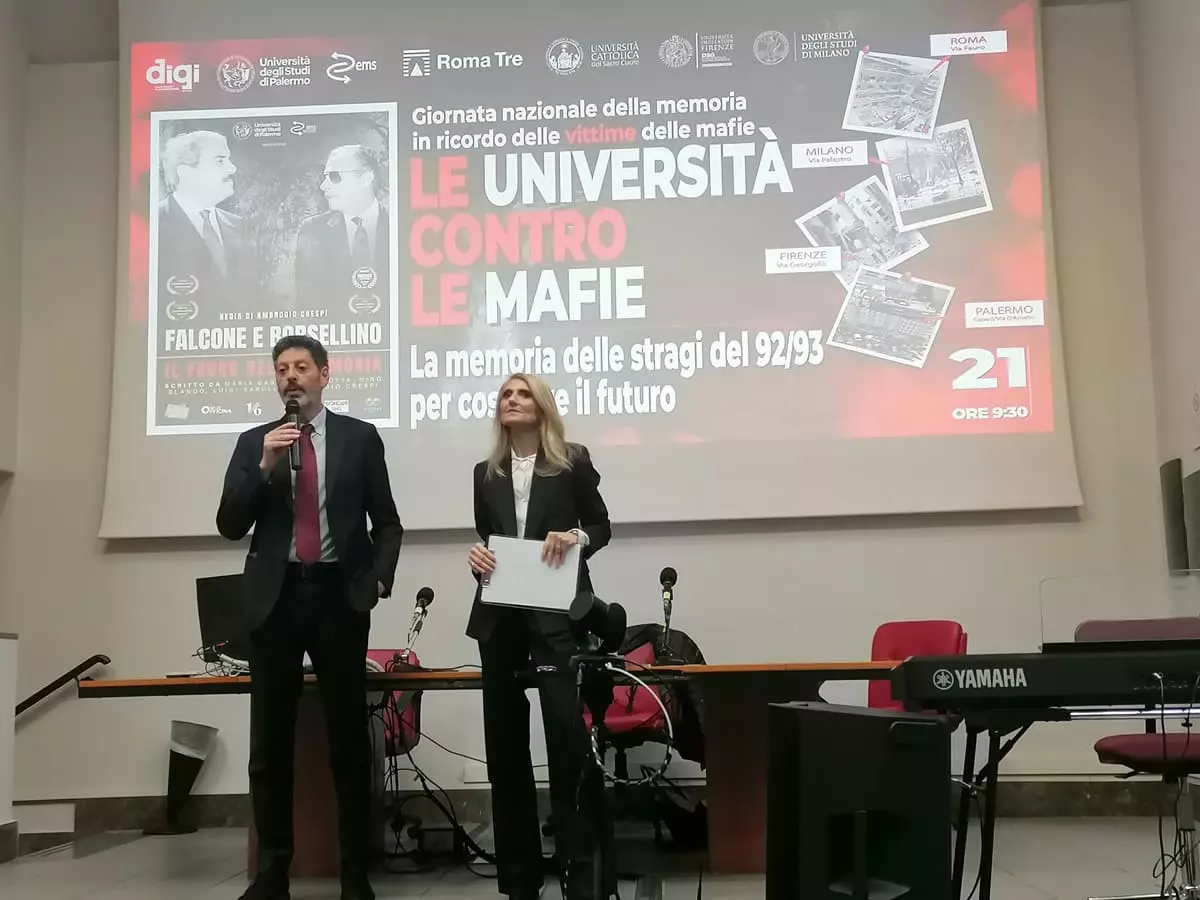PALERMO (ITALPRESS) – Four cities united in remembrance and in the desire to convey a message of social commitment against organized crime, with the academic world acting as a go-between: the Universities of Palermo, Roma Tre, Florence and Milan (Statale and Cattolica) celebrated the Day of Remembrance and Commitment in memory of the victims of all mafias with as many events involving a large student component, from both universities and secondary schools. The choice of coordination among these cities is not accidental: they are in fact the Italian realities hit by Mafia massacre in 1992 and 1993.
Each university wanted to pay tribute to the victims by setting up a day of debate that, in addition to students, involved representatives of the academic, political, cultural and judicial scene: particularly touching was the joint screening, at 10 a.m., of Ambrogio Crespi’s docufilm ‘Falcone and Borsellino. The Fire of Memory,’ made by the Department of Political Science at the University of Palermo as part of the ‘Workshop for Legality and Memory’ project funded by Miur.
The venue chosen for the Sicilian capital is the former Edison cinema, now used for lectures and examinations at the Faculty of Law: the event was attended, among others, by the University of Palermo’s vice chancellor Enrico Napoli and Fiammetta Borsellino, Paolo’s daughter. The magistrate’s other children also joined the initiative, Manfredi at the Florentine university and Lucia at the Roman one.
“This appointment allows us to broaden our gaze and connect different Italian university locations in the cities where, in those terrible years, very serious episodes took place,” Napoli emphasizes, -It was a dramatic moment in the history of our country, and memorializing it is one of the tasks we all have, cultural institutions first and foremost: memory is the point at which history becomes life, anyone who lived through that period must pass it on and make it become life for young people as well.
For Fiammetta Borsellino, “days like today’s are fundamental, because they involve everyone in a common commitment: it is nice that it is the young people who act as a common thread. The docufilm ‘Falcone and Borsellino. The Fire of Memory’ is a very important vehicle of knowledge for those who were not there then but also for those who were, so that we can continue to reflect on events that have deeply marked the history of our country. Memory has to be nurtured with daily acts and with everyone’s commitment: what I always tell the kids is that mafias know how to reorganize and readjust to new socioeconomic contexts, the fact that they are no longer shooting and placing bombs does not mean they are no longer there. It is in moments of silence that reorganization happens: it is precisely the violent actions that have provoked a reaction from the state, and this is counterproductive for mafias.”
Each university that joined the initiative received messages from University Minister Anna Maria Bernini and the chairwoman of the parliamentary Anti-Mafia Committee Chiara Colosimo. From Bernini the applause in “seeing that universities are networking, especially on such a sensitive issue as the fight against mafias. I thank you both as a minister and as a citizen: this day of commitment against the mafias sees some Italian universities symbolically united in a choral embrace, which extends to the entire country. We remember those terrible massacres, which left deep wounds in the country and whose memory we must always treasure: we need an important sensitization of young people for a future under the banner of legality. Once again academia proves to be a garrison of truth, justice and memory: we are all children of Falcone and Borsellino.”
Colosimo echoes her view that “uniting universities is a new way to truly tell the story of the victims of the Mafia. Falcone and Borsellino left us a better Italy and we must not forget their sacrifice: the only way to nurture the memory of those who lost their lives against the Mafia is to continue to fight it every day.”
– photo xd8/Italpress –
(ITALPRESS)

